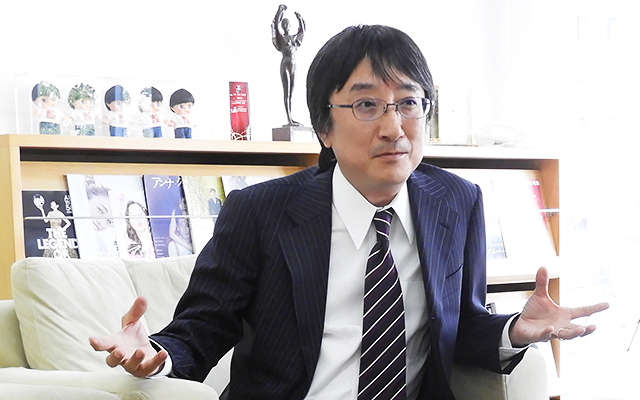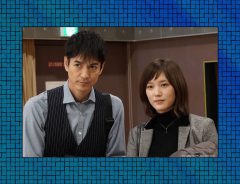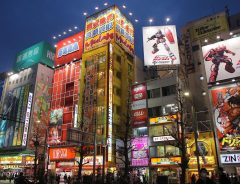
With permission from © Horipro International, Inc. | Photo © grape Japan
Interview With Horipro International CEO Yoshitaka Hori (Part 2): On Succeeding Abroad
- Tags:
- CEO / Cool Japan / Death Note The Musical / Horipro / Horipro International / Interview / Japan Expo / May'n / selling abroad / Success / Yoshitaka Hori
Related Article
-

EXCLUSIVE INTERVIEW: “Absolute Zero 4” Special Talk: Ikki Sawamura, You Yokoyama & Tsubasa Honda
-

Interview with The Anime Man: On Voice Acting in Pop Team Epic and More
-

Juri Ueno exclusive interview Fall 2020 from “Asagao – Forensic Doctor 2”
-

Yoshino Kimura exclusive interview from “Alive: Dr. Kokoro, The Medical Oncologist”
-

How to study for the JLPT? Asking an N1 holder with full marks! [interview]
-

How Akihabara went from consumer electronics mecca to capital of ‘Cool Japan’


Introduction
In June 2018, Japanese entertainment giant HoriPro Inc. announced the creation of HoriPro International, a new company wholly owned by HoriPro, with the goal of aggressively expanding overseas with a focus on Asia. Aiming for the “creation of world-class specialists,” HoriPro International manages voice actors and music artists with international potential. May’n, Azusa Tadokoro, Ami Wajima, Machico, DJ YURIA, and cosplayer Liyuu are some of the more famous members in the current lineup.
At the helm of HoriPro International is visionary leader Yoshitaka Hori, President & CEO of HoriPro Inc. A vital contributor to the HoriPro Group ever since he joined in 1993, Mr. Hori has been president since 2002 and chairman since 2008.
We had the good fortune of interviewing Mr. Hori at length in his Meguro office to gain insights into the background and establishment of Horipro International, his vision for Japanese musical and voice talents as well as stage productions on an international scale and the way his own experiences abroad have influenced his thinking.
Our interview will be released in three parts.
Continued from Part 1
Realizing the need: experiences abroad
grape Japan (gJ): I see! How did your personal experience abroad influence the establishment of Horipro International? Would you mind sharing some specific episodes with us from the United States, Europe or Asia?
Yoshitaka Hori (YH): One episode relates to stage shows, and Yukio Ninagawa, specifically. He has promoted Cool Japan by himself for the past 30 or 40 years. He’s world-famous. I just came back from seeing his show last week, and I can tell you, whether it’s in London or New York, his shows are always packed! Most of the time, for Japanese culture abroad, it’s mainly locally-residing Japanese people who attend. But with Yukio Ninagawa, it’s the opposite, and there are hardly any Japanese in the audience. That’s something I experienced first-hand.
With permission from © Horipro International, Inc. | Photo © grape Japan
Death Note the Musical
Here’s another episode: We made this movie together with Nippon Television called Death Note. I was having a drink with the lead actor Tatsuya Fujiwara at a pub in London when a stranger came up and said to him: “You’re a movie star, right? I’ve seen your work.” Apparently, he’d watched Death Note and Battle Royale.
Then, when I went to New York, there was a fan waiting backstage with a Yagami Light tattoo on his leg. He told Tatsuya: “Meeting you is a dream come true.” That left an impression on me, since I understood that there really were people watching out there. Around the time we realized that it was up to us to create international stage productions, we suddenly got a suggestion from the frontlines: “How about Death Note?” And just like that, we decided to make a Death Note musical.
We made the show with the understanding that we’d cross the Pacific or the Dover Strait one day, even if it would take 20 or 30 years for it to happen. From the beginning, we had the script, lyrics and the songs all made in New York. For the whole thing, we started with an English script. We showed that to a producer in South Korea, telling him he could use the set after the show ended in Japan, so we could hedge our risks on both sides. He agreed, and that’s how we pulled off consecutive shows in Japan and South Korea.
Japan Expo in France
Going back to May’n in Singapore, I realized that the need was there only after I traveled to Singapore myself. The same with France, when I went to Japan Expo. May'n started her talk with English greetings, but they asked her to say something in Japanese. “Why Japanese? Why can’t I say something in English,” she asked. “No, no, this is Europe. We’re not hung up on English, and anyway, we all want to hear Japanese,” they said. Everyone was singing in Japanese, and when I looked at the audience, I could hardly see any Japanese faces.
Also, now I know the gap between reality and what’s reported by the Japanese press. In Japan, they call it the largest event introducing our country in France. When I looked out my hotel window, right in front of the station closest to the expo, I saw people in cosplay waving swords around. Apparently, they come from all around Europe on Eurorail passes. And that’s why they have 400,00 to 500,000 attendees. But despite it being an event of such a scale, the largest pavilion right in the center belongs to Samsung. Meanwhile, Japan’s Ministry of Economy, Trade and Industry doesn’t even send a single official. Well, they’ve begun sending them over now. So, I could see for myself the difference in understanding between the local scene and what Japan likes to report.
There’s what we see and believe, on the one hand, and what the locals say, on the other. When the two of them line up, that’s when it’s time to act. Even if they’re a bit scatterbrained and you’ve no idea who they are, just go, go, go! Give it a shot. If you insist on getting things in writing first, the opportunity will have already ended. This is just the way I saw it. I didn’t benefit from any analysis aside from what I saw with my own eyes. That’s the way things are at the current stage.
Not Cool Japan
gJ: So, in other words, if you follow the traditional style often seen in Japanese companies with a long process carefully considering all the risks and debating in meetings before any actions are taken, you won’t be able to keep up?
YH: You won’t be able to keep up. I’ve often attended those Cool Japan meetings run by the government, and the things we were saying 20 years ago, they haven’t achieved a single one. They’re still doing things they were doing 20 years ago. They ask me to attend so I go to their meetings, but it’s just silly, if you ask me. The only thing I do is tell them what I personally experienced and the impressions I had.
But even when I tell them they’re spouting nonsense, they don’t listen to me. They look at data produced by impressive think tanks, but this data is no different than the data I saw four years ago. So, I tell them nothing’s changed in the last four years. They haven’t learned or made any progress. It’s always like that.
With permission from © Horipro International, Inc. | Photo © grape Japan
Besides, you know “Cool Japan.” By the time they created the Cool Japan Fund, there wasn’t anyone left in the world who still called themselves “cool.” So, even though I wouldn’t use the term, they said the decision was made, so there’s no helping it.
You end up with everything from anime, music, movies, rice, cars and folk craft, all lumped together without any focus, all the provinces of Japan all together, and even anime thrown in. So, when they go to Thailand or wherever it might be, you’ll have people singing anime songs, and next to them, rice. It ends up looking like a regional food fair at a department store.
Doing it that way, nothing is going to change. If you tell customers you have everything, they won’t be able to choose a thing. But if you tell them: “Look at this,” then customers will think: “Oh, really? What’s this?” and give it a closer look. There’s no analysis being done of what the locals need. Especially if you make a point of saying it’s from Japan, you’ll only get Japanese people interested.
What really sells abroad
When we made Death Note [the musical] and it appeared in media with headlines playing it up as a world-class production, some Japanese people on Twitter said things like: “Foreigners made it, so it’s not a Japanese production.” Do you see Indians getting upset when people eat curried rice at CoCo Ichibanya? Do you see Koreans getting upset when people eat a yakiniku bowl at Gyukaku? [since yakinku is commonly believed to have Korean origins]. No, because that doesn’t happen. But then, Japanese people will say they can’t accept sushi made by Vietnamese staff.
Junmai sake vs. Yamazaki whisky
That’s why you have Japanese people saying: "Let’s sell sake only made with Japanese rice!" There’s no way that’s going to sell, expensive as it is. Only rich people can afford it. If you want rich people to buy it, that means stocking it in luxury hotel bars. The problem is, unlike wine, nobody polishes off an entire bottle of sake. And since rich people are usually health-conscious, sake, with its high sugar content, is only something they like to sip when they go out for sushi. It’s definitely not something they drink every day. In New York, it’s Yamazaki whisky they want to drink, not sake.
But the Japanese government doesn’t want to proactively sell Yamazaki whisky. They think the British would get upset or American bourbon makers would get upset, so they don’t do it. So, instead they try to push junmai sake [pure sake with no distilled alcohol added] abroad, which doesn’t sell now and won’t ever sell in the future. Even though umeshu [Japanese plum wine] might sell better. And then there’s a liqueur made by Suntory called Midori which has been in American bars for the last 30 or 40 years.
gJ: Ah yes, I know it.
YH: But nobody talks about Midori in Japan.
gJ: Really?
YH: We don’t get information on what really sells abroad. While sitting here in Japan, Japanese people will say: “This is the way it should be.” Look at TV shows like Yū wa Nani Shi ni Nippon e? YOUは何しに日本へ? (Why Did You Come To Japan?) or that show introducing Japanese people living in remote parts of the world. But there’s no point in Japanese people patting themselves on the back saying: “Look how great we are.”
Hospitality gone wrong: all wrapping, no substance
gJ: When handling foreigners, people here talk about omotenashi [the Japanese term for hospitality, recently turned into a buzzword] but I often see only the Japanese side imagining what would make foreigners happy. If that’s all they do, however, they may end up not being able to provide what foreigners truly want.
YH: Right. Japanese people say: “Go to that department store. You won’t find another place that wraps up your purchases as nicely as they do.” And foreigners might say: “Wow.” But that’s just the same as [Chinese] tea pouring performances, or Japanese steakhouses where they twirl the meat around. They should just cut it. It’s turned into a show. Most people in this world share the opinion that you don’t need a show in your everyday life. But cracking jokes and showing how fast they can twirl the meat has become the main act.
To succeed abroad, go with the flow
When Japanese people go abroad, they end up wanting Japanese things. That’s why they get stressed. When they go to a K-Mart and have their purchases stuffed haphazardly into a huge bag, they get the strong feeling that they’re being looked down upon. “I’m the customer, I’m a god. How dare you treat me like this?” That’s the kind of ingrained thinking you have to get rid of. The Japanese culture of wrapping up purchases will never become a world standard. I’m 100% sure of that.
With permission from © Horipro International, Inc. | Photo © grape Japan
gJ: I see. So then, to gain a true understanding, you need to just go, go, go abroad. Put aside any fear or apprehension and just go there. That’s what’s important. Is that it?
YH: Yes, just go! You only get to complain once you’ve become the ruler of your domain. This is something I keep telling them (points to Yatabe) and I’ve also said it at our morning assemblies. Trying to break into a foreign market isn’t the same thing as going over as a customer. We’re there to grab a share of their market, so it’s normal that they’re going to be wary of us.
For example, there was this concert. When I went, it was an arena which could seat thousands but suddenly, wham, there was a power shortage. The guy from the other Japanese agency was furious. “What are you people doing?” he shouted. But that’s just par for the course over there. People like him don’t realize they should be grateful just to have regular electricity every day. That’s why Japanese are disliked wherever they go abroad. They’re seen as complainers and sticklers for details.
When it comes to talents or even managers I take along with me when I go abroad, I never choose people who complain about hotel baths not having hot water. No hot water is normal. No matter how expensive the hotel you stay in, there’ll be times when you just don’t get hot water. Sometimes, not even cold water either. That’s why you need to throw away ideas which are too Japanese. It’s the complete opposite of cool, in the original sense of the word.
Concludes in Part 3...
Original interview in Japanese (abridged): 世界に通用するスペシャリストの創出を目指す ホリプロ社長・堀義貴氏インタビュー